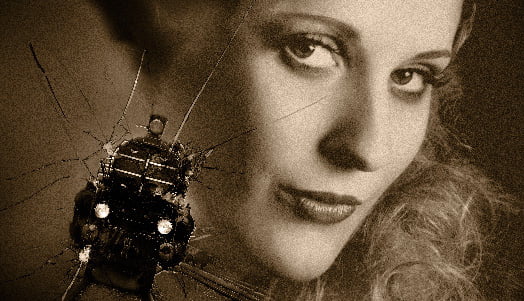
Home Chat is the latest play the consistently ambitious Finborough Theatre have brought to the stage in a daring revival. The play was first shown to a disapproving audience in 1927 and has largely been forgotten about and left to gather dust ever since. Noel Coward sought to explore the moral hypocrisy facing women at a time when change became ubiquitous. Women’s liberation meant a new type of woman was emerging from the effects of World War 1 and carving a new pathway towards equality. Everyone was aware of the unprecedented movement for change determining social etiquette and, just like today, women’s liberation is equally tied to its inescapable consequence of judgement from others.
Throughout the 1920’s women boldly redefined how women should behave and made up new rules. It is very fitting that in 1927, when this play was performed, women’s hemlines had been raised to knee length, the shortest they had ever been. Janet Ebony (Zoe Waites) is the personification of the ultimate flapper, an unstoppable vivacious force of life that drives the play — she breezes into every scene stealing the show with her charisma. Ultimately she is the only character who we really care about.
She escapes from a devastating train crash whilst having shared an overnight train with a male friend Peter Chelsworth (Richard Dempsey). She is shocked to return to heavy disapproval from her bickering mother-in-law and a husband who offers his forgiveness for her wrongdoings. Her indignation at being wrongly accused of infidelity causes her to go on what is intended to be a feminist journey of self-discovery but ends up being another overnight stay in a hotel with her male best friend.
A flaw that derails the play is the overly tactile friendship between Janet and Peter. They ooze more chemistry than Scarlett O’Hara and Rhett Butler, so just about anyone would assume they were lovers who indulged in steamy trysts on sleeper trains. The play is meant to be a jibe at the unfair societal expectations and constraints on women, but being caught sharing an overnight carriage with a member of the opposite sex wasn’t the best catalyst to use. Coward would have been much better using a much less incriminating scenario—one which would have made it easier for the audience to share Janet’s indignation.
Her pompous husband, played with conviction by Tim Chipping, suffers from being overly reserved even by British upper class standards, but his character is so self-contained the audience can’t help but feel the marriage would be better over anyway. The pacing holds little delicacy as her character swings between cackling glee to rageful indignation, and slightly jarringly she never once stops to care about all the other passengers who died in the train crash.
Coward does manage to expose the only good example of double standards through the wonderfully woeful and pathetic Mavis, who harbours a cringingly obvious crush on Mr Ebony. But with the exception of a few disparaging looks from a disapproving butler, she is still not prevented from following Mr Ebony around his married home. Their incredibly close friendship equates to a form of cheating. As Mavis states early on: “She is a little bit envious of my understanding of you.” Coward beautifully demonstrates the hypocrisy of a man indulging in one form of extra marital affair who is quick to judge his completely innocent wife.
Just as Janet represents a new type of woman—brave, witty, assertive, adorned in stylish clothes and red lipstick—Mavis represents the opposite. A pre-flapper type woman who is never capable of speaking her mind and who waits pitifully for Mr Ebony to leave his wife.
Women were one year away from gaining the vote and so the world was on the cusp of change. This play engagingly highlights one woman’s journey of struggling to understand how to balance what she feels is right versus what society expects of her. It is a shame that this drawing room drama only has smatterings of Noel Coward wit that is dispersed far too thin and without the usual comedic potency. Possibly the weaknesses of this play can be explained by Noel Coward also feeling too constrained by the time period to really delve deeply into the effects a broken marriage can have on a woman’s sexual liberation. What we are left with is essentially a silly, fun play about the merits of tea, jibes about hats between mothers-in-laws, and a play which remains on the edge of something but never at any point teeters over into greatness.
Filed under: Theatre & Dance

Comments